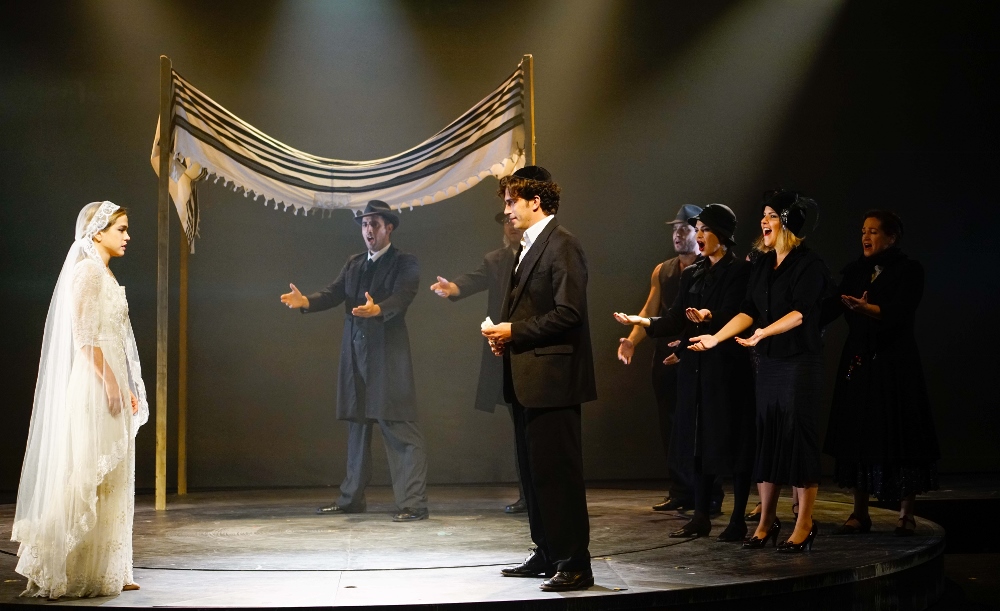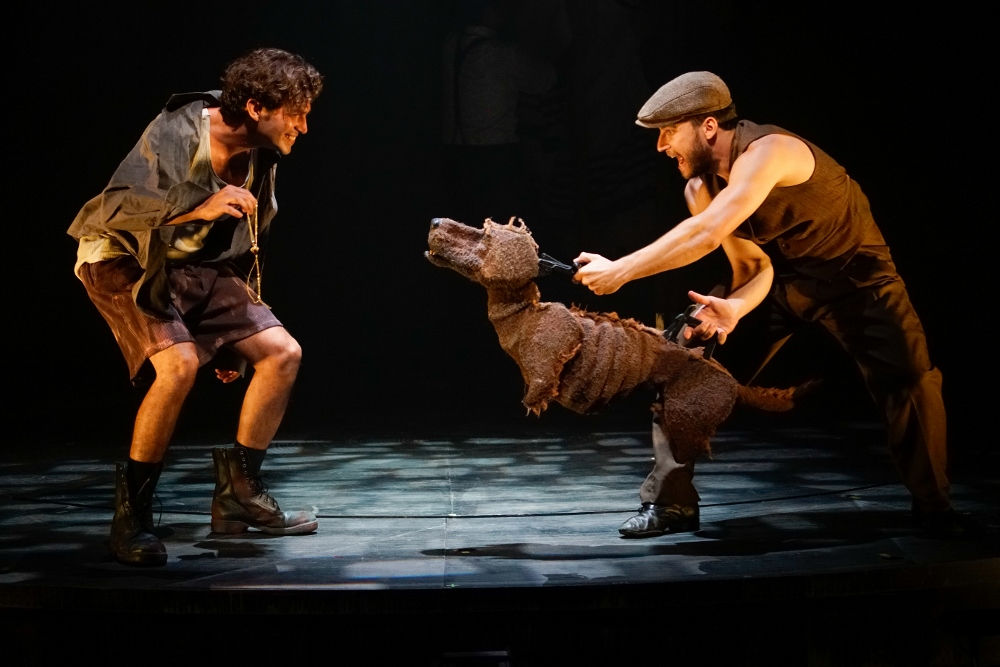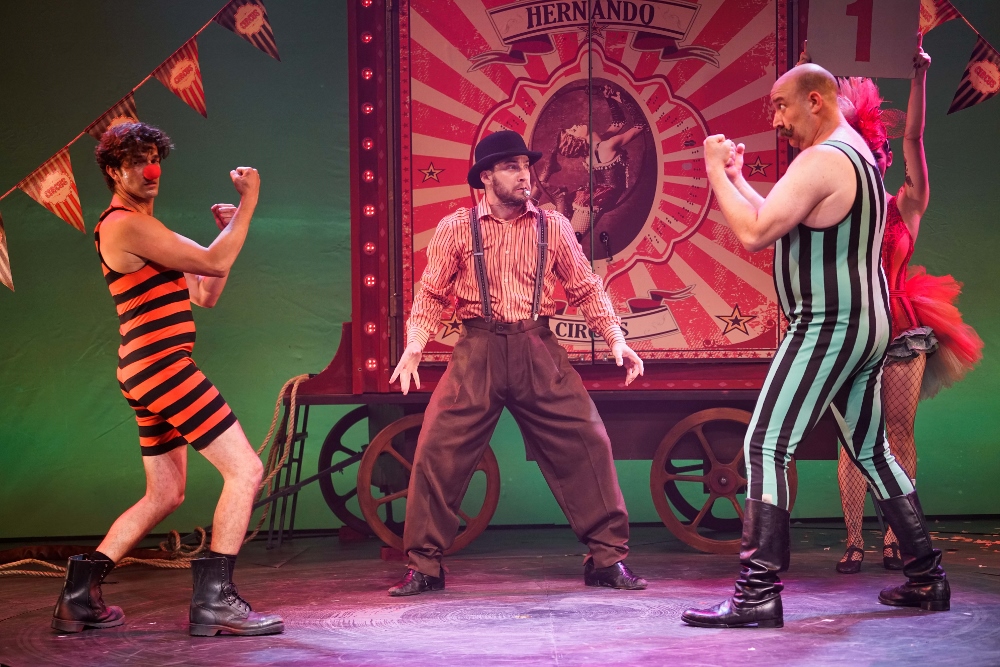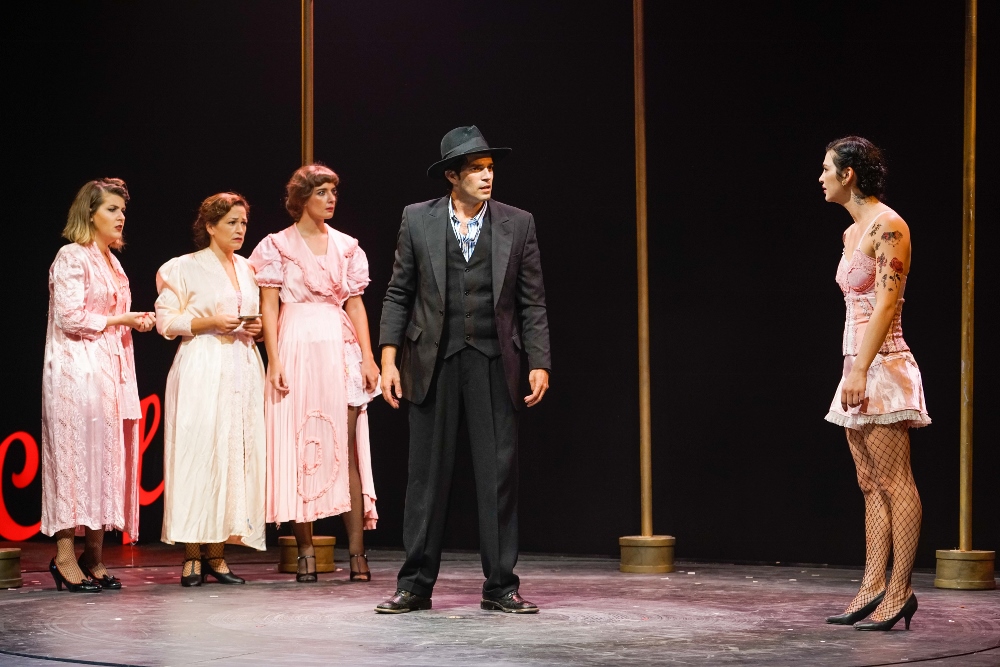Action, suspense, sex, crime, and betrayal are not the typical attributes one associates with narratives of the Jewish community in Eastern Europe in the early 20th century, yet King of Dogs, directed by Irad Rubinstein, presents this less explored aspect of Jewish life in a vivacious, colorful, production at Beit Lessin, marked by creative staging, and excellent performances. The play, written by Yoav Shutan-Goshen and Irad Rubinstein, is based on Sholem Asch’s novel Motke the Thief (Motke Ganev 1916). While the outline of the narrative appears fairly faithful to the original, the play, directed by Irad Rubinstein, takes the story to an exciting theatrical space, with circus arts, puppetry, movement, and contemporary popular songs.

Lively and entertaining, these crowd-pleasing features are not mere bells and whistles. In approaching a work like Motke the Thief, the writer/director is confronted by a serious challenge: how to engage the audience’s empathy for an unsavory character like Motke? Because Motke, as the novel’s title might indicate, is not a nice guy. Born into poverty and harsh conditions, Motke is educated in the school of street smarts, and graduates with honors, going from a childhood of petty thievery to brothel owner and major player in the underworld. Opening with a stark, minimalist set, the stage almost bare, except for the four poles of the Chuppah and its tallit canopy of white and blue. A clarinet weaves a Yiddish-hued melody, with ominous overtones, and a man walks onto the stage. Handsomely dressed in a wedding-white shirt, he rubs his vest with an agitated hand, trying to brush off the dirt he sees there, whether real or symbolic. King of Dogs begins as Motke (Shlomi Tapiero, who alternates with Tom Hagi in this role) is on the brink of happiness, his marriage to the lovely, pure, and pious Hannah (Agam Rudberg). The joyous Klezmer music associated with weddings in the ‘old country’ is replaced here with a dark, rendition of Leonard Cohen’s Hallelujah, the wedding guests clad in black, performing a stylized dark version of Jewish dance, evoking an ominous dissonance.

King of Dogs plays on the familiar trope of a bad guy redeemed by the love of a good woman, yet one of the strengths of the play is in the way the question is presented and explored: Can he be redeemed, is Motke indeed a changed man? The viewer journeys back with Motke into his past, living in dire poverty, forced to survive by his wits, speed, and brute strength. Shlomi Tapiero is outstanding as Motke, exuding an irresistible charm and occasional vulnerability, conveying the complexity of this character with his capacity for cold brutality. Motke lives outside the warm circle of Jewish life in the shtetl, he is an outsider, and he makes his way alone. Almost alone – he has a dog. The dog is a scruffy, skinny, lovable dear of a puppet brilliantly executed in all aspects – kudos to Amira Pinkas and Studio Marbe Yadaim, Sharon Silver, and Ofri Biterman. The choice of a puppet to portray the dog is not only an effective staging solution, it also subtly underscores Motke’s outsider status.

Outsider and outcast, Motke finds a refuge of sorts in a community that exists beyond the boundaries of normative life – the circus. Here he encounters and must contend with a colorful, enticing, and sometimes dangerous group of characters – Siamese twins, fortune tellers, acrobats, and of course, the strong man. Maor Zabar’s creatively conceived costumes emphasize the extreme change from life in the normative Jewish community to the imaginative world of illusions. Life with the circus is never dull, and the tension mounts with non-stop action and romantic tensions. The actors take on multiple roles, bringing dramatically different characters to life with each changing chapter in Motke’s history. Yuval Yanai stands out with his portrayal of the ingratiating, bumbling, cheerful, Matchmaker, as well as the rough, thug Kanrik, creating two memorable and distinctive characters, embodying each with astonishing totality.
Movement and music play a central role in the production. Where one might be repelled and distanced from the actions and choices of Motke and other characters, the music draws us in. Here too, the director’s choice is deliberate and distinctive. Rather than draw on Klezmer and the canon of Jewish traditional music, the songs of Leonard Cohen are the musical thread that runs through the play, weaving an emotional connection throughout. The contemporary songs are a reminder of the distance between contemporary audiences and the long-gone Jewish world of Eastern Europe, and at the same time, these songs – Hallelujah, Bird on a Wire, The Partisan, Ain’t No Cure for Love, Who By Fire, as part of the contemporary collective consciousness connect us to that world with a very immediate, intimate, visceral connection.
One’s feelings for and about Motke shift as he changes, encountering and confronting new people and experiences. Central to the drama is his relationship with Mary (Sari Simhov), the aerial hoop performer. Simhov’s performance is sparkling and seductive, her execution on the hoop (choreography by Neta Polak) is lovely. Mary’s character provides not only romantic tension, but she is also a fascinating counterpart to Motke. Like him, she is a victim of circumstance, like Motke, she must make difficult choices in order to survive. King of Dogs entertains and excites as it asks the quintessential questions: What makes a person good or bad? Can a person change? It is a strength of this play that, at its dramatic conclusion, there is still room for thought, questions, and conversation. Reflecting on the character of Motke, and the issue of his redemption, it is Mary who is on my mind.

King of Dogs
Based on Motke Ganev by Sholem Asch
By Yoav Shutan-Goshen and Irad Rubinstein; Directed by Irad Rubinstein; Set Design: Svetlana Breger; Costume Design: Maor Zabar; Music: Roy Yarkoni; Lighting Design: Ziv Voloshin; Movement: Amit Zamir; Doll design and construction: Amira Pinkas and Studio Marbe Yadaim; Training of the doll: Sharon Silver; Yiddish consultation: Mendy Kahn; Accompaniment and aerial choreography: Neta Polak; Assistant Director: Cnaan Eliel; Cast: Ofri Biterman, Tal Danino, Gil Wasserman, Tom Hagi/Shlomi Tapiero – Motke, Yuval Yanai, Shirley Lev-Wetheimer, Anna Zuckerman, Agam Rudberg, Hadar Shahaf, Sari Simhov.





